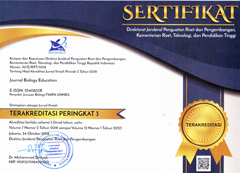SIKAP PROFESIONAL CALON GURU BIOLOGI TERHADAP PROFESI GURU
Abstract
Abstract
___________________________________________________________________
The purpose of this study was to describe biology teacher candidates’ attitudes toward teaching professions after their involvement in PPG SM-3T ‘Pendidikan Profesi Guru-Sarjana Mengajar di daerah terluar, terdepan dan tertinggal’, a pilot model of professional teacher education in which teacher candidates were to finish two major training programs, a one-year social service program for rural and remote schools as part of character buildings and a one-year at campus professional teacher education as part of academic strengthening programs. A survey design was implemented on all 28 PPG SM-3T participants of first batch, as the entire population of interest. A questionnaire of 30 items was administered on the basis of the component of attitude and distributed to all participants. They were asked to express their belief and attitude toward the four key domains of teacher competencies (pedagogical, personal, social and professional capabilities) as stipulated by the Indonesia Ministry of National Education Decree Number 16 Year 2007. The results showed that a considerable part of the participants (96%) indicated that they had positive professional attitudes toward teachers as profession. Almost 96% of them showed positive attitudes towards pedagogical and professional capabilities, 89% and 93% of them also indicated they had positive attitudes towards personal and social competencies.
Abstrak
___________________________________________________________________
Penelitian ini bertujuan untuk mendeskripsikan sikap profesional calon guru biologi terhadap profesi guru setelah terlibat dalam program Pendidikan Profesi Guru Sarjana Mengajar di daerah Terluar, Terdepan dan Tertinggal (PPG SM-3T). Program ini merupakan suatu model yang menuntun calon guru untuk menjadi pendidik profesional dengan cara menyelesaikan dua pelatihan utama yang terprogram, yakni satu tahun melaksanakan program pengabdian di sekolah daerah 3T sebagai suatu cara membentuk karakter ke-Indonesia-an dan satu tahun melaksanakan program pendidikan profesi guru di kampus yang merupakan bagian dari penguatan bidang akademik. Metode yang digunakan ialah survey design. Survei dilakukan kepada seluruh peserta PPG SM-3T sebanyak 28 peserta pada angkatan pertama dengan menggunakan instrumen berupa skala sikap. Aitem yang terdapat pada skala sikap sebanyak 30 yang disusun berdasarkan komponen pembentuk sikap dan dibagikan kepada seluruh peserta. Peserta diminta untuk menyatakan kesetujuan/ ketidak setujuannya pada setiap pernyataan yang telah disusun berdasarkan keempat kompetensi guru yang harus dimiliki oleh seorang pendidik. Keempat kompetensi tersebut tertuang dalam Peratuan Pemerintah No 16 Tahun 2007. Hasil yang didapatkan menunjukkan bahwa sebagian besar peserta (96%) memiliki sikap profesional positif terhadap profesi guru. Hampir 96% peserta menunjukkan sikap yang positif terhadap kompetensi pedagogik dan profesional, kompetensi kepribadian mencapai 89% dan kompetensi sosial sebesar 93%.
Â
Â
References
Abdurrachman, A. 1993. Psikologi Pendidikan. Yogyakarta: PT Tiara Wacana Yogya.
Akuntono, I. 2011. 3.000 Sarjana Dikirim ke Daerah “3Tâ€. Kompas.com, 26 Desember 2011.
Ajzen, I. 2006. The Theory of Planned Behaviour. http://people.umass.edu/aizen/tpb.diag.html.Diunduh tanggal 19 Mei 2013
Ary, D., LC Jacobs & C. Sorensen. 2010. Introduction to Research in Education. Wadsworth: Cengage Learning
Azwar, S. 2009. Penyusunan Skala Psikologi. Yogyakarta: Pustaka Pelajar.
Baron, R. A.& Byrne, D. 2003.Psikologi Sosial.Ed. 10, Jilid 1. Jakarta: Erlangga.
Collinson, V., Killeavy, M., & Stephenson, H. 1999. Exemplary teachers: Practicing an ethic of care in England, Ireland, and the United States. Journal of Just and Caring Education, 5 (4), 340-366.
Combs, A. W. 1974. Humanistic goals of education. Educational accountability: A humanistic persperctive. San Fransisco: Shields.
Crano, W. D. 1997.Vested Interest, Symbolic Politics, and Attitude-Behaviour Consistency.Journal of Personality and Social Psychology, Vol 72 (3), 485-491.
Creswell, J. W. 2008. Educational research: Planning, conducting, and evaluating wuantitative and qualitative research (3rd ed.). Upper Saddle River, NJ: Prentice Hall.
Fazio, R. H. 1995. Attitudes as object-evaluation associations: Determinants, consequences, and correlates of attitude accessibility. In R. E. Petty & J. S. Krosnick (Eds.), Attitude strength: Antecedents and consequences (pp. 247-282). Mahwah, NH: Lawrence Erlbaum Associates.
Fazio, R. H., Martha C. Powell, Carol J. Williams. 1989. The Role of Attitude Accessibility in The Attitude-to-Behavior Process. The Journal of Consumer Research, Vol 16 (3), 280-288.
Kraus, S. J. 1995. Attitudes and the prediction of behavior: A meta-analysis of the empirical literature. Personality and Social Psychology Bulletin, 21: 58-75.
Krosnick, J. A. 1988. The Role of Attitude Importance in Social Evaluation: A Study of Policy Preferences, Presidential Candidate Evaluations, and Voting Behavior. Journal of Personality and Social Psychology, Vol 35 (2), 196-210.
[NCATE] National Council for Accreditation of Teacher Education. 2008. Professional Standards for Accreditation of Teacher Preparation Institutions. Washington: NCATE.
Petkova, K. G., Ajzen, I., & Driver, B. L. (1995). Salience of anti-abortion beliefs and commitment to an attitudinal position: On the strength, structure, and predictive validity of anti-abortion attitudes. Journal of AppliedSocial Psychology, 25: 463–483.
Priester, J. R & Richard E. Petty. 2001. Extending the Bases of Subjective Ambivalence: Interpersonal and Intrapersonal Antecedents of Evaluative Tension. Journal of Consumer Psychology, 13 (3), 289-300.
Schulte, L, Edick N, Edwards S, Mackiel D. 2004. The Development and Validation of the Teacher Disposition Index. Edu essays 12.
Taylor, R. L., Wasicsko M. M. 2000. The Dispositon to Teach. Kentucky: Eastern Kentucky University.
Whaley, D. 1999.Assessing the Disposition of Teacher Education Candidates States. National Evaluation Systems Inc. www.nesic.com/PDFs/1999.//whaleyDiunduh pada 2 Juli 2013
The copyright of the article once it is accepted for publication shall be assigned to the journal as the publisher. The intended copyright includes the right to publish the article in various forms (including reprints). The journal maintains the publishing rights to the published articles.
This work is licensed under a Creative Commons Attribution 4.0 International License.







